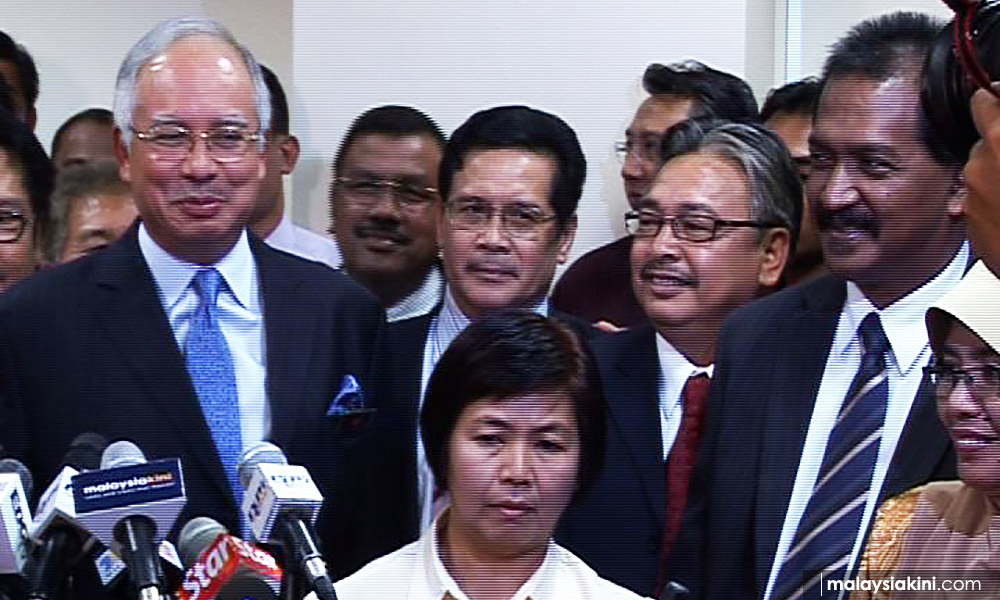
GE14 | Behrang, a small town located along the Bernam River that divides Perak and Selangor, has never been known for much apart from its rubber and oil palm plantations.
But in 2009, the town that had just 18,000 voters found itself under the national spotlight, and for all the wrong reasons.
The state assemblyperson that the people of Behrang had elected less than a year prior, PKR's Jamaluddin Mohd Radzi, had gone missing.
He finally emerged on Feb 4, 2009, where he joined two other Pakatan Rakyat elected representatives to announce that they had become BN-friendly, triggering what is now known as the Perak Crisis.
The defection, supposedly engineered by then deputy prime minister Najib Abdul Razak, allowed BN to retake power in Perak, after losing it for the first time during the 2008 general election.
Nine years on, local PKR leaders admit that the betrayal of its elected representative was a black mark that the party has found difficult to shake off.
Behrang is one of three state seats under the parliamentary seat of Tanjung Malim. The others are Sungkai, held by DAP, and Slim, held by Umno.
PKR won Behrang in the 2008 general election by a 1,027-vote majority, but following the defection of its assemblyperson, the party was defeated by 1,968 votes in the 13th general election.
For the 14th general election, PKR has decided to surrender the seat to Amanah, in the hope that the relatively new PAS splinter party can take a crack at the state seat and shear off the stigma of the past.
However, this does not mean PKR can wash its hands off the unpleasant history, as the party also contests at the federal level, namely the parliamentary seat of Tanjung Malim.
PKR’s Tanjung Malim campaign coordinator Alif Asyraf said the party has had to mitigate the potential impact, even though Jamaluddin's defection happened almost a decade ago.
Alif told Malaysiakini that when canvassing voters in areas considered ‘grey zones’, about one in 10 voters still raised the issue, albeit this is not said to be the main deciding factor for their vote.
“They say they have voted PKR – meaning Jamaluddin – but after he won he defected. They were disappointed by that and didn’t want to vote PKR anymore (in GE13)," he said.
For the opposition, grey zones are considered areas with a concentration of fence sitters, white zones are its own strongholds and black zones the BN strongholds.
Out of the 22 Behrang polling districts, 13 are considered by PKR to be grey zones. This has not changed with the redelineation exercise completed last week.
No 'Teja' vu
For GE14, PKR has decided to bring in a Perak heavyweight in the form of Chang Lih Kang, who has been the state assemblyperson for Teja since 2008.
According to Alif, PKR hopes that by fielding a senior leader with a long history in Perak it can help inspire confidence.
“This time, we try to convince the people that our candidate (Chang) is not a new candidate. He is experienced and has been an assemblyperson for two terms.
"So, we convince voters that this will not happen again. Even in 2008, there were those who tried to buy this assemblyperson over but failed.
"We tell voters that these are the factors to convince them that this is not a candidate who can be bought over," he said.
Chang has been laying the groundwork in Tanjung Malim since 2016.
Tanjung Malim is an important battleground seat as its incumbent is MCA secretary-general Ong Ka Chuan.
Ong won the seat in 2008 with a 5,422-vote majority. He managed to retain the seat in 2013 with a 4,328-vote majority against Tan Yee Kew, who in 2008 had defected from MCA to PKR.
PKR's coalition partner DAP has already begun to roll out a plan to strike MCA at the core of its leadership for GE14, as witnessed by the fielding of heavyweight Liew Chin Tong to take on MCA deputy president Wee Ka Siong in Ayer Hitam.
Chang, like Liew, will have the arduous task of dislodging a key MCA general in a Malay-majority seat, which has become the last bastion of the Chinese party.
In GE13, Tanjung Malim was composed of 53 percent Malay, 27 percent Chinese, 14 percent Indian voters. -Mkini



No comments:
Post a Comment
Note: Only a member of this blog may post a comment.